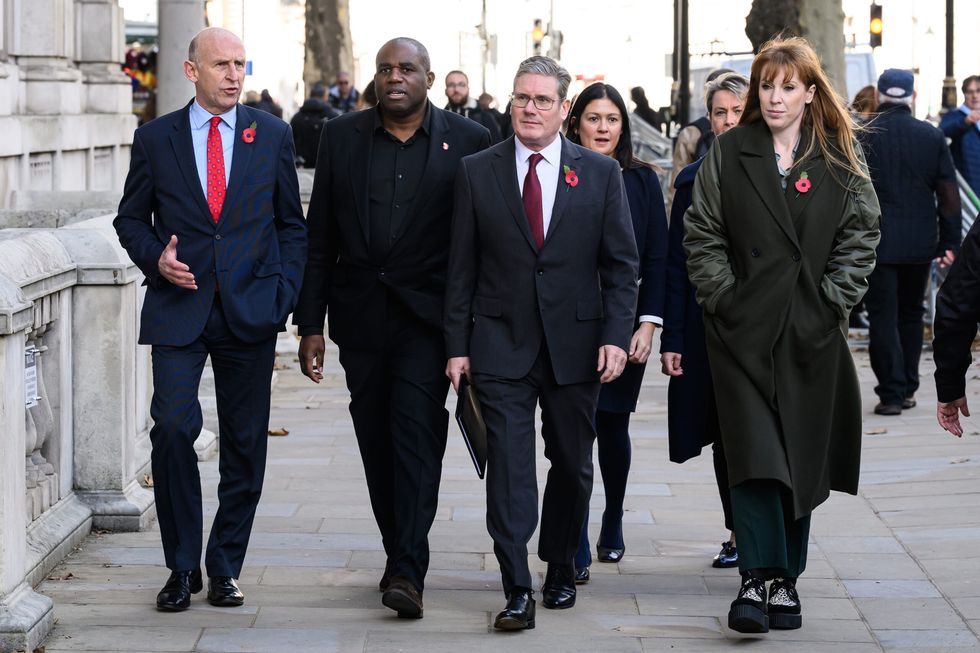THE Labour MP, Lisa Nandy, believes whichever party wins the next general election faces a battle to overcome a public perception that politicians can no longer “transform people’s lives”.
Prime minister Rishi Sunak shocked the nation last Wednesday (22) when he announced that the general election will take place on July 4.
The Labour party currently holds the largest polling lead over the Conservative government since Liz Truss was prime minister. The latest YouGov/Times voting intention poll has the Tories on 20 per cent and Labour on 47 per cent, while an average of major polls collated by the Economist gives Labour a 23-point lead.
Speaking at an event hosted by the UK in a Changing Europe (UKICE), Nandy, the shadow minister for international development, said her party was not complacent over a general election win.
“It’s a very odd dynamic. David Lammy (shadow secretary of state for foreign, Commonwealth and development affairs) and I do a lot of travelling. We’ve been in the Middle East, in particular, in recent months – and we are being treated by many of our partners as the incoming government,” said Nandy.

“But we’ve got to win an election and we really don’t take anything for granted, not least because I’ve given up predicting anything in British politics after the events of the last decade.”
Nandy was elected MP for Wigan in 2010. During her time in parliament, the 44-year-old has seen five different Tory prime minister.
“I’ve had 14 years of a ringside seat to the destruction that’s been done to people in places like Wigan and around the world,” she said.
“It might sound like a cliché, but actually, there is a level of anxiety and anticipation about the next general election because everything is at stake, not just for Labour, but for the country.”
The Labour leader, Sir Keir Starmer, last Thursday (23) told voters at an event in Gillingham, southeast England, that he wanted to renew, rebuild and reinvigorate Britain. He focused on deprivation and the invisible barriers that prevent many from improving their lot.
Referencing children who live in innercity areas where big corporations such as Google have a presence, he said: “They cannot imagine themselves ever making that journey from their school to those jobs. It’s a few hundred yards.”
Nandy believed that a Labour government will have to work to rebuild the public’s trust in politicians.
“The biggest challenge for us is getting into government and then in actually being able to deliver for people, and overcoming this sense that politics really has lost the ability to transform people’s lives,” she said.
“We will inherit a very difficult economic situation for most people in this country now. The fact that people are really struggling to just afford basic essentials, mortgages, rents, food.
“Also, particularly, we saw during Covid the disgraceful way that the government behaved – making the rules, breaking the rules, lying about it, laughing about it. That has really damaged people’s faith in politics.
“When I was first elected in 2010, there was a very anti-politician mood because it was in the wake of the expenses scandal. But I feel this is something much deeper and much more profound.”
Local elections earlier this month showed the ongoing Israel-Palestine conflict had the potential to play a significant role in voter intentions, especially among Muslim voters.
The Labour party increased its vote share in most areas, and even won control of councils in places it had not won for decades. But it also saw a decrease in its vote in crucial areas with a high number of students and Muslims.
In 58 local council wards analysed by the BBC, where more than one in five residents identify as Muslim, Labour’s share of the vote was 21 per cent down on 2021, the last time most seats were contested.
Labour’s Ellie Reeves admitted the party had “a lot of work to do” to rebuild support among Muslim voters before the general election.
Nandy, who is the former chair of Labour Friends of Palestine in the Middle East, called for an immediate ceasefire and urgent focus on a two-state solution. She said the international community had not done enough to seek a lasting solution to the regional conflict before the latest outbreak of war.

“If I could give one message to those people both here in the UK and over in Israel, Palestine and the wider Middle East, it’s that we are absolutely not indifferent to what is happening,” said Nandy.
“That’s not just because this regional crisis is having knock-on effects across the rest of the world, it’s because actually Britain has a long and deep involvement in Israel and Palestine and and we could not care more about helping to resolve it.
“The last generation really has dropped the ball. We’ve had 50 years of people talking about a two-state solution, while the prospect of a two-state solution disappears literally in front of children’s eyes in the West Bank.
“There’s nothing good that comes out of a moment like this, except that we’ve got to focus our minds. Our generation has to pick this up and make sure that we are the last generation to be dealing with what’s been a decades-long crisis.”
Nandy said that Gaza was a “perfect example” of how the Labour party would engage with the rest of the world.
“David (Lammy), Keir (Starmer), John Healy (shadow secretary of state for defence) and I have been very clear that we see defence, development and diplomacy as the three pillars of our engagement with the world. We see the three things as having to work hand in hand,” she said.
The closure of the Department for International Development (DfID) and cutting the aid budget in 2020 led to further strained relationship between Britain and some of the poorest countries in the world, added Nandy.
“Over the last six months, I have spent a lot of time across the Global South and the Middle East, and Africa, and nobody’s talking about to me about Brexit.
“But they are talking to me about the decision to not just abolish the Department for International Development, but also the decision to slash funding overnight which literally pulled the rug out from under some of the poorest people in the world and left a lot of our allies to plug the gap,” said Nandy.
She vowed that a Labour government would never let that happen again as it did not reflect British values.
“What I really started to feel very profoundly is this sort of cynicism that drove people like Boris Johnson to abolish the department, calling DfID the ‘giant cashpoint in the sky’, and to claim you could help children here or children abroad, but not both, it’s just not reflective of the country that we live in.
“My constituents in Wigan give more as a proportion of their income to charities like Oxfam than my colleagues in Westminster. Our local firefighters go off and do post-conflict reconstruction work in their spare time. I’ve got doctors volunteering in hospitals in Gaza right now.
“This is not a British government story. It’s not a Labour government story. Actually, it’s a British story about the ordinary extraordinary people who have always made a contribution to the world, and continue to do so even when their government does not.”

















 Kap’s Cafe in Surrey was struck by gunfire late at night with staff still insideInstagram/
Kap’s Cafe in Surrey was struck by gunfire late at night with staff still insideInstagram/ Kaps Cafe Instagram Story Instagram Screengrab/
Kaps Cafe Instagram Story Instagram Screengrab/ Kaps Cafe Instagram Story Instagram Screengrab/
Kaps Cafe Instagram Story Instagram Screengrab/

